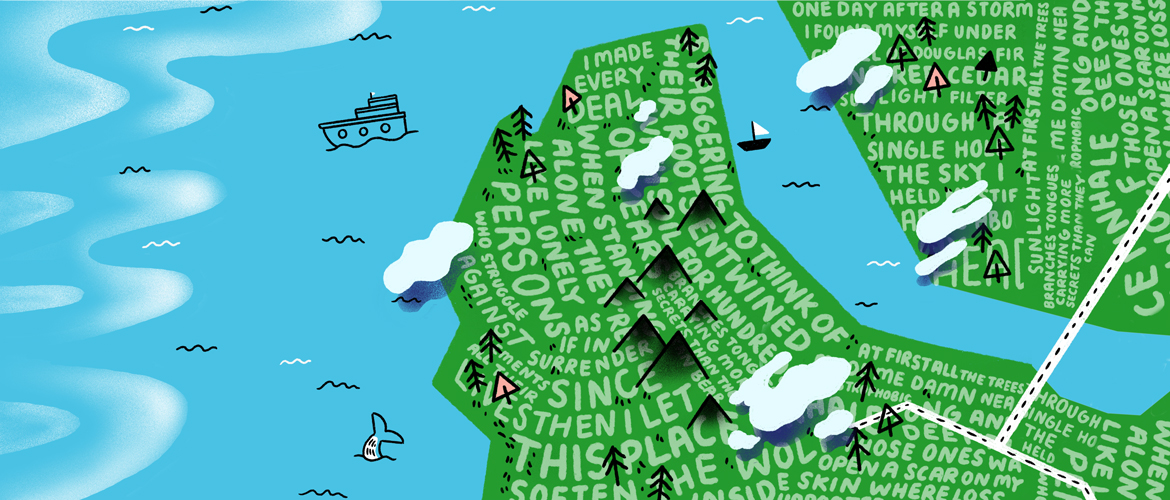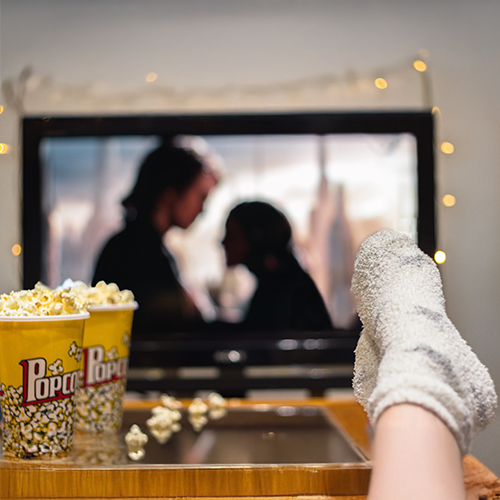Whatever you’re looking for, you can probably find it mapped online. From coffee shops to gas stations, nearby options are noted on Google maps with location markers. But what if you’re seeking something less utilitarian? What if a location-based poem is what you’re after?
There’s a map for that too.
A team of UW English majors recently created an online ecopoetry map of Washington state, populated with site-specific poems that celebrate the state’s diverse environments. By clicking on any of 56 location markers that dot the map, visitors can read a poem referencing that location, from the Olympic Rain Forest to urban Seattle to the Palouse in Eastern Washington.
“I have spent my life in and around Washington’s mountains, so poems about those landscapes felt personal and emotional,” says Nola Peshkin, who created the map with classmates Mackenzie Price, Cole Martinez, and Alexandria Spofford. “The poems served as a great jumping off point to dive into other poetry.”

The ecopoetry map was one of four group projects created for a poetry seminar course taught by Frances McCue, senior lecturer in the Department of English. The course, The Triggering Town: The Poetics of Place in a Globalized World, focused on Northwest poetry published in the decades following the 1963 death of Theodore Roethke, renowned poet and UW professor.
“We followed Roethke’s influence downstream,” says McCue, who assigned poems by accomplished Northwest poets but also challenged students to search for poems by non-white, non-academic poets published in the 1960s and 1970s. That nearly impossible task shed light on the limited opportunities for poets outside the academic mainstream at the time.
I hope...the poems encourage a deeper connection with our surrounding landscape.
Among the poets discussed was Richard Hugo (BA, MA, Creative Writing, 1948, 1952), a Roethke student whose book of essays about writing, The Triggering Town, was McCue’s inspiration for the class. “Triggering town” refers to a technique to help beginning writers start poems by focusing on a sense of place. Hugo died in 1982, just as the Northwest poetry scene was blossoming with new venues and literary journals outside of academia.
“Poetry walked right off campus in the 1980s,” says McCue, who encouraged her students to contact poets who were part of that blossoming. Students spoke with the founder of literary programming at Bumbershoot, the founding editor of a literary magazine published since the 1980s, and others who were part of the poetry scene’s growth.
While exploring Northwest poetry from a historic perspective, the students also studied the structure and intention of poems. They had an enthusiastic guide in McCue, who has been passionate about poetry since childhood. “Poetry, in the beginning, was a way for me to have a voice,” says McCue. “And then I fell in love with the machinery of it — how it worked and how pieces snapped together and how it connected to readers. I realized that poems matter. They have a nuanced but very real power that can shift the world.”

To help her students discover that power, McCue shared examples of existing projects that pair poetry with community, including the Seattle Poetic Grid, a map of Seattle-based poetry created by Claudia Castro Luna, now Washington State Poet Laureate. McCue then divided the class into small groups to develop community-based projects of their own. One group created a short documentary about members of the poetry-slam community; another organized a poetry reading at a tea house to celebrate the work of Asian American poets in the Northwest. A third group, with guidance from UW graduate student Joe Concannon, developed a high school poetry curriculum featuring the work of four Northwest poets. The final group, inspired by Luna’s Seattle poetry map, developed the statewide ecopoetry map, adding in-depth analysis of four poems representing different regions of Washington.
Initially, the map group struggled to find poems from all areas of the state. “We really wanted an expansive poetry map,” recalls team member Mackenzie Price. “We did not want to fall into the trap of [just] featuring poems from Seattle and other urbanized areas of Western Washington, so looking for poems that took place in Eastern Washington and less talked-about places was a big factor.”
McCue nudged the team toward poets from other parts of the state, and the students found many more examples on their own, both online and in published books about Washington poets. “Google was definitely our friend in this process,” says Peshkin, who also received suggestions from poets she contacted about being included in the map. “There were tons of poets who connected me with others, suggested poems we hadn’t found yet, and started brainstorming spinoffs from the website, like poetry readings or meetings. Everyone we talked to was supportive and impressed, which was so flattering and exciting!”
The students hope the poetry community will build on their work, adding more examples to the map. Most of all, they would like the map to inspire others as it has inspired them.
“I hope the map helps others find connections to Washington through poetry,” says Peshkin, “and that the poems encourage a deeper connection with our surrounding landscape — ideally moving people to preserve and protect the land for future generations.”
More Stories

AI in the Classroom? For Faculty, It's Complicated
Three College of Arts & Sciences professors discuss the impact of AI on their teaching and on student learning. The consensus? It’s complicated.

A Love of Classics and Ballroom
Michael Seguin studied Classics at the UW and now owns Baltimore's Mobtown Ballroom. The two interests, he says, are more connected than they might seem.

Need a break from holiday movies? Try these
For those wanting a break from holiday movies, Cinema & Media Studies faculty and grad students offer suggestions.